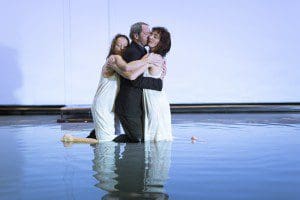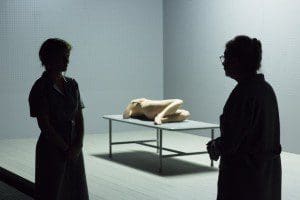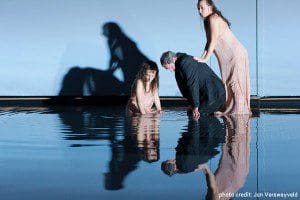Under the Spell of Ivo van Hove, Ingmar Bergman Has His Say
Forget the sanctified Image Maker. Don’t bother to bone up on Ingmar Bergman’s films before seeing Toneelgroep Amsterdam’s raw and urgent twofer, After the Rehearsal/Persona, which will have its U.S. premiere in the 2015 Fringe Festival in Philadelphia. What’s the point of seeking to certify a heartbreaking work of stagecraft by comparing it to Bergman’s cinema aesthetics?
Allow me to press the point. Shortsighted comparison freaks come in two rabid forms. Film devotees tend to hate on Bergman movies-to-play forays because they can’t help but be sincere to a thudding fault. And then there are bleary-eyed critics — Christopher Isherwood’s New York Times review of van Hove’s Cries and Whispers being a prime example — who lazily argue that “Bergman’s use of dramatic magnifying close-ups is more or less impossible to translate effectively.” To which we can only say, well, duh. What of it?
For both of these replicants, Ingmar Bergman is like a sacred cow. These predictable drudges, based on my years of experience shuttling between the five Nordic countries in search of good theater, are missing the greater point. The film world has always thumbed its nose on the literary merits of Bergman’s writings, a majority of which consists of film scripts and workbooks. Collectively, the Flemish-Belgian director Ivo van Hove, the Antwerp-born scenographer Jan Versweyveld and the animalistic actors of Toneelgroep Amsterdam have been creating a new and path-finding stage expression that seeks to defy aged and rusted beliefs about the dramatic values of Bergman’s heightened language and stage-worthy dialogue.
The Flemish-Belgian director Ivo Van Hove fesses up that recently he’s been seeing more movies than plays. As general director of Toneelgroep Amsterdam since 2001, he’s been too caught up in a nexus of his own making. His life and work yoke together his creative leadership of a large Dutch repertory company, the rehearsal-room busy-ness he takes part in, plus his vaunted role as the Netherlands’ foremost international export. Even his love life is caught in the wrangle. His longtime partner, the talented Jan Versweyveld, works full-time with him.
The fruits of all these binding commitments are made manifest in a growing body of work, which can be parsed into three groups. Like Bergman, van Hove tackles classical dramas (Shakespeare, Ibsen, Moliére, Eugene O’Neill, and Tennessee Williams). Impish and daring, van Hove is a mischievous Puck, as opposed to Bergman’s High Priest.
 Van Hove also fesses up to a weakness. He admits to not engaging with original plays by fresh new voices. As if in reaction (I think in recompense) for this lack of interest, van Hove has been making slow inroads into what he likes to call “contemporary classics” (Lillian Hellman’s Little Foxes, Charles L. Mee’s True Love and A Perfect Wedding, and Tony Kushner’s Angels in America).
Van Hove also fesses up to a weakness. He admits to not engaging with original plays by fresh new voices. As if in reaction (I think in recompense) for this lack of interest, van Hove has been making slow inroads into what he likes to call “contemporary classics” (Lillian Hellman’s Little Foxes, Charles L. Mee’s True Love and A Perfect Wedding, and Tony Kushner’s Angels in America).
A third slew in van Hove’s directorial résumé consists of wild, sometimes immersive stage interpretations of film scripts by Ingmar Bergman, Luchino Visconti, John Cassavetes, Michelangelo Antonioni and Pier Paolo Pasolini. These forays are not adaptations, however. The difference may seem semantic, but it’s significant enough to bear repeating: van Hove is not strictly interested in staging films—he is interested in staging screenplays. He has no desire to stage-manage the transcendence of movies.
Anyone seeing van Hove’s After the Rehearsal/Persona must therefore confront some fascinating challenges. Can you envision the theatrical possibilities of Bergman’s film scenarios? Can you imagine a reinvention of Bergman the filmmaker into Bergman the emerging dramatist who keeps a closet of psychological chamber plays in his Swedish film archives?
Born in Belgium in 1958, van Hove is today one of world theater’s most immensely talented auteurs. His intense actor-centered productions shatter the fourth wall of representational plays and push the emotional subtext right to the top. As Jan Versweyveld tells me, the Dutch ensemble’s ambition is “more about making a Happening.” In effect, van Hove and Versweyveld create performance-design theater.
The wellspring of Bergman’s genius lies in the sure knowledge that, as he himself puts it, “there are a lot of realities in our reality.” In that regard, van Hove’s concept of pairing After the Rehearsal and Persona strikes me as insightful and intelligent. During Bergman’s retirement as a film director, he kept linking Persona to Cries and Whispers (both deal with the plights of women). Yet in van Hove’s more objective view, After the Rehearsal is more properly the thematic yin to the Persona‘s yang.
Utterly specific, tightly constructed, played in one set, After the Rehearsal dramatizes the emotional torments of Henrik Vogler, an aging stage director who hides within the confines of a rehearsal room. For him, theater is life, and life is theater. Two female actors—a young, promising leading lady and an over-the-hill actress—hurl their messy ambitions at him, their fear of public humiliation and their aching need for his validation. Backstage turns into a kind of confessional. At the same time, it is not entirely clear that what happened to Henrik did actually happen. Perhaps the play consists of Henrik’s memories of taking advantage of actors—of manipulating them with his power and intellect, if not his love and loyalty.
 Persona unearths the neurotic travails of yet another theater artist—yet another Vogler. This time, she is an actress. Inside a severely lit room, Elisabeth Vogler nakedly writhes on a hospital bed. While Henrik talks on and on (and on) about acting, Elisabeth stops speaking one night in the middle of a performance of Electra. And she hasn’t said a word since. Her silence signals a powerful rejection. She has taken revenge against the fiction of theater and the chaos of real life. A hard-hearted doctor dismisses Elisabeth’s difficult behavior: “You must be infantile to be, at this time, an artist,” the doctor says.
Persona unearths the neurotic travails of yet another theater artist—yet another Vogler. This time, she is an actress. Inside a severely lit room, Elisabeth Vogler nakedly writhes on a hospital bed. While Henrik talks on and on (and on) about acting, Elisabeth stops speaking one night in the middle of a performance of Electra. And she hasn’t said a word since. Her silence signals a powerful rejection. She has taken revenge against the fiction of theater and the chaos of real life. A hard-hearted doctor dismisses Elisabeth’s difficult behavior: “You must be infantile to be, at this time, an artist,” the doctor says.
In van Hove’s translucently clear interpretation, Ingmar Bergman’s men and women give us messy stuff to puzzle over. Language breaks down. Illusions are rent asunder. Realities dissolve. After the Rehearsal touches our feelings because of Bergman’s personal admission (perhaps van Hove’s, too?) that the theatrical illusions are becoming truer than reality itself. Persona is a defiant cry. It is a howl of silence that wants to ward off life’s abject painfulness and the threat of theater’s utter uselessness. Together, they convey Bergman’s troubled ambivalence to the roles that theater and fiction—by extension, art—play in our lives, in our relationships and in our social realities.
Like Bergman, Ivo van Hove is not a destroyer but a re-creator. They’re of a piece, as they relate to the mischiefs of stage directing. A massively gifted auteur — again just like Bergman — van Hove has been reinventing the Swede’s screen texts in the classical manner by using a dedicated inventiveness. In the Toneelgroep Amsterdam’s After the Rehearsal/Persona, Ingmar Bergman the incipient contemporary dramatist is finally reborn.
A New York–based editor and writer, Randy Gener contributes to National Public Radio, Miami Herald and The Global Post. His 12 years as senior editor of American Theatre magazine earned him the George Jean Nathan Award for Dramatic Criticism and the Society of Professional Journalists’ Deadline Club Award for Best Arts Reporting.
Photos by Jan Versweyveld.
After the Rehearsal / Persona
Written by Ingmar Bergman
Directed by Ivo van Hove
Toneelgroep Amsterdam (Netherlands)
23rd Street Armory
22 South 23rd Street
Sept 3-5 at 8:00 pm

